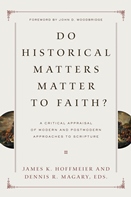At this point in history we expect to hear denials of the trustworthiness of Scripture from the liberal wing. It is rather new, however, to hear expressions of a similar lack of confidence in Scripture from professing evangelicals. Do historical matters really matter? And what is really at stake in the question? Is Genesis 1 reliable history? How About The Gospel accounts of Jesus’ resurrection? Anyone paying attention to the question quickly recognizes that historical matters do indeed matter to faith.
It hardly needs to be pointed out that Jesus and the New Testament writers understood the Old Testament as altogether reliable. And, as Warfield so famously reminded us, if we acknowledge that the Bible is reliable in matters of faith, then we must acknowledge its historical veracity, for this is one of its teachings regarding our faith. In short, historical matters really do matter, and Christianity itself rests on historical truth claims.
This is the conviction driving each chapter in this book, that the Bible is true in all that it affirms. In Do Historical Matters Matter to Faith? a team of scholars from various specific disciplines in Old Testament, New Testament, history, archaeology, biblical theology, systematic theology, and historical theology come together to demonstrate that careful investigations in diverse fields dovetail together to support the doctrine of biblical inerrancy. Even historical matters matter to the biblical writers.
This is not the best “first” book on biblical inerrancy, and it is not a book for the new believer – virtually each chapter assumes a degree of acquaintance with the discussion. But with its twenty-two chapters and more than 500 pages this work from Hoffmeier and Magary provides a remarkable compendium of learning and valuable resource for pastors and teachers and anyone willing to enter the discussion at the scholarly level.
Fred G. Zaspel
